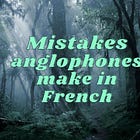15 mistakes anglophones make in French
Part 2: Les erreurs les plus courantes qui viennent de l'anglais
This is the second article in a series where I outline the most common mistakes anglophones make in French without realizing it. In other words, I’m pointing out details you may not have heard before, not the usual problems you’ve heard before in other books and courses on the subject.
To read the first article, go to:
15 mistakes anglophones make in French

Conversation
In English, it’s common nowadays to use the word conversation to mean topic. It’s better to use the word sujet in French.
For example:
C’est un sujet intéressant, j’adore parler de ça
It’s an interesting conversation, I love to talk about that
In French, conversation only means a discussion or a chat. For example:
J’ai eu une bonne conversation avec elle
I had a good conversation with her
L’art de la conversation est perdu
The art of conversation is lost
Convenient
This word translates best as pratique or commode.
This location is very convenient, it’s close to everything
Cet endroit est très pratique, c’est proche de tout
Actually
This word is overused in English, and doesn’t translate as actuellement – which means en ce moment.
It’s best to say:
En fait, je crois qu’on devrait consommer mieux et moins
Actually, I think we should consume less and better
En fait can also be put after the conjugated verb:
Ils sont en fait ukrainiens
Actually, they are Ukrainians
Expectation
The word expectation doesn’t exist in French. Don’t invent it!
The word expectative exists, but it’s quite formal. It’s best to say une attente for “an expectation.”
It’s difficult to live up to her expectations
C’est difficile de se montrer à la hauteur de ses attentes
👉 Note : Here the expression is: se montrer à la hauteur des attentes de quelqu’un.
I’ve heard so much about this restaurant, I have high expectations!
J’ai tellement entendu parler de ce restaurant, mes attentes sont élevées!
It’s best not to have too many expectations
C’est mieux de ne pas avoir trop d’attentes
To focus on something
This expression translates as se concentrer sur quelque chose. You might hear some French speakers say focuser sur quelque chose, but it’s an anglicism to avoid.
I need to focus on my French verbs
Il faut que je me concentre sur les verbes en français
It’s also possible to say se focaliser sur quelque chose.
Ils se sont focalisés sur le problème du décrochage scolaire
They focused on the problem of dropouts
Just
To say in French that you just did something, you have to say:
Je viens de faire quelque chose
You can also add the word juste:
Je viens juste de faire quelque chose
❌ Don’t say: J’ai juste fait quelque chose
I heard that
Don’t make the mistake of saying:
❌ J’ai entendu que Montréal est une belle ville
In French, we say:
J’ai entendu dire que Montréal est une belle ville
Or :
J’ai entendu parler de ce spectacle!
I heard about that show!
The two possibilities are:
Entendre dire que quelque chose est…
To hear that something is…
Entendre parler de quelque chose
To hear about something
To notice
To translate:
I noticed that people in Québec are very friendly
You can say:
J’ai remarqué que les gens au Québec sont très gentils
Realize
To say:
I realized that I still have a lot to learn
You have two options. You can say:
Je me suis rendu compte qu’il m’en reste beaucoup à apprendre
Or :
J’ai réalisé qu’il m’en reste beaucoup à apprendre
The first expression is more idiomatic to French. The second one is an anglicism, but it is now commonly used.
In the 80s, in the 70s
In French, you have to say:
Les années 80
Les années 70
Also, for more recent decades:
Les années 2000
The decade 2000-2009
Les années 2010
The decade 2010-2019
The point
In French, le point doesn’t have the meaning of “matter” or “idea.” Some francophones increasingly use this anglicism, but it’s criticized and doesn’t sound correct.
You can translate it in different ways.
“You have a good point!”
C’est intéressant ce que tu dis
Tu a bien raison!
Je comprends très bien ce que tu dis
“The point is that we should proceed with caution.”
Le fait est que nous devrions avancer avec prudence
Ce que j’essaie de dire est que nous devrions avancer avec prudence
Je crois que nous devrions avancer avec prudence
It was fun
In Quebec, we say:
C’était le fun
If you don’t say le, it’s not really Quebecois!
To say:
It was a lot of fun
❌ Don’t say c’était beaucoup de fun.
Instead, say, in Québec:
👉 On a eu beaucoup de fun
Or:
👉 C’était très le fun
Not much
To answer the question what’s new, what’s up?
You can say:
Pas grand-chose
Pas grand-chose is a common expression.
❌ Don’t say: Il n’y a pas beaucoup qui se passe
Speaking in French
With the verb parler it’s more common not to use a preposition.
Don’t say:
Elle parle pas du tout en anglais
Say:
Elle ne parle pas du tout anglais
Dedicated to
The problem with this expression is that it can have many meanings. Of course, French has multiple words to convey these different meanings.
Nous n'embauchons que des gens sérieux
Nous n'embauchons que des gens qui sont dévoués à leur travail
We only hire people who are dedicated
Elle est entièrement dévouée à sa mère âgée
She is dedicated to looking after her aging mother
Il consacre tous ses efforts à aider les gens défavorisés
He is dedicated to helping the poor
C’est un site consacré au golf
It’s a website dedicated to Golf
The keyword to remember here might be the verb se consacrer à quelque chose, which means to “dedicate oneself to something.”





Merci encore
Merci!! ces expressions sont vraiment utiles ici au Québec dans notre conversation quotidienne.